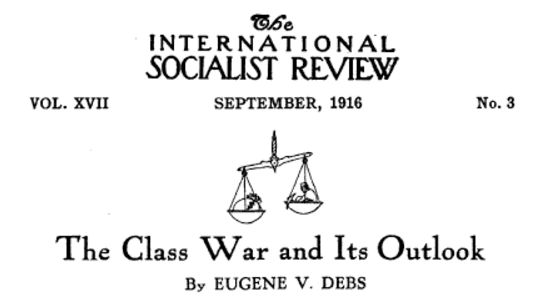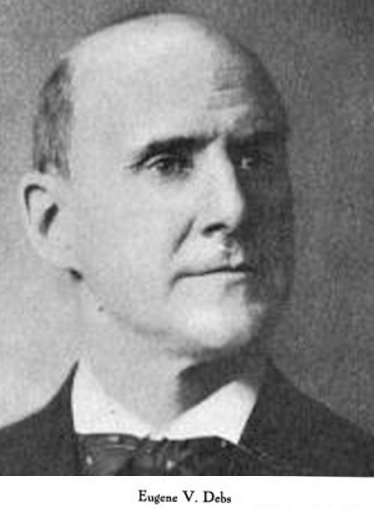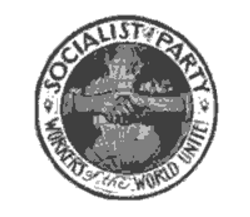The industrial union embracing all
and fighting and winning for all
is the demand of the hour and
the lesson of the years.
-Eugene Victor Debs
~~~~~~~~~~~~~~~~~~~~~~~~~~~~~~~~~~~~~~~~~~~~~
Hellraisers Journal, Friday September 1, 1916
For the Review: Debs Reflects on Labor Day
LABOR DAY is drawing near and I have been asked by the Review to say a word for the special number to be issued for the celebration of that day. Labor Day this year will furnish abundant material and inspiration for its celebration.
At this writing twenty thousand iron workers are fighting for their lives on the Misaba Range. We see scarcely a mention of this desperate battle in the capitalist press and, if it were not for our own papers, chiefly the INTERNATIONAL SOCIALIST REVIEW, we would know little about the fierce industrial conflict raging in that section of the country.
For many years it has been deemed a criminal act to attempt to organize the workers on the Range. They have been herded like animals, worked to the limit and compelled to accept what their masters saw fit to dole out to them, and it was only when their condition became absolutely intolerable that they rose in revolt. At this hour they are fighting their brutal masters with the fierce energy of desperation. The strike came spontaneously and all the workers are united in one fighting body as they should always be united in every fight against the master class.
Will these embattled wage-slaves win? We cannot say. We can only hope. They are fighting the whole power of capitalism and the criminal corporations pitted against them are leaving no stone unturned to crush their strike and destroy their attempt at organization. Starvation will play a leading role if the strikers are finally beaten. Meantime the courts and other authorities of the capitalist state are working overtime on the side of the corporations. Gunmen with out number are on the ground, spies and detectives infest the ranks of the strikers, and everything possible is being done to break up the strike. It is the same old story and it may turn out in the same old way, but if it does something substantial will have been gained, for no such battle is ever wholly lost.
A few days ago I was in Pittsburgh and in the vicinity where the recent riots were incited as a result of the Westinghouse strike. Several strikers were killed and some others injured, but not a corporation gunman received a scratch. The rioting was instigated as usual by corporation hirelings and as usual the blood that was shed was drained from the veins of the slaves. Wholesale arrests swiftly followed, but not a gunman was taken into custody. The mercenaries who did the killing are exempt from the law because their masters rule the law. The arrested and indicted victims were all strikers and summary “justice” was meted out to them for having made it necessary for the gunmen to fire upon them, beat them up, and murder their comrades.
This battle is recorded as having been lost. But it was not lost. The spirit of revolt is stronger than before and the fresh crop of dragons’ teeth sown there will bring forth in due time an army of mailed industrial warriors.
The railroad employes in the train service have just voted overwhelmingly to strike if their eight-hour day is not granted. May the strike come if the railroads do not surrender! There is little probability of the latter. There is more fear of a compromise.
In this case the employes have nothing to concede, nothing to compromise, and nothing to arbitrate. They have got to win or lose their whole demand.
The fatal tactics of craft unionism are in evidence in all the preliminary stages of this struggle. The negotiations and manoeuverings have lasted over a year and the unions have given the railroads all this time to prepare to knock them on the head.
The essential weakness of the movement lies in its craft union aspects; the strength of it in its tendencies toward industrial unionism. These unions in the past have had no connection and little or no sympathy with other unions and other workers. In the words of the late P. M. Arthur, beloved and honored as the wisest of leaders by the railroad corporations, they have believed in “minding their own business” and “going it alone.” When the shop and office employes struck they stuck to their jobs, and when their members undertook to help the strikers they were expelled.
The eight-hour movement of the railroad workers ought to embrace all the employes in the service and express their industrial unity in the demand upon the corporations, and if the leaders are wise they will insist upon the demand for the eight-hour day for all employes and issue the call to all to back them up in the fight. Section men and common laborers are as much entitled to the benefits of this and every similar movement as are engineers and conductors. The time for craft union aristocracy has gone by. The industrial union embracing all and fighting and winning for all is the demand of the hour and the lesson of the years.
The class war this year is raging with unusual intensity in the United States. All about us men are striking and they are striking more unitedly and with better results as a rule than ever before.
The awakened and awakening workers who are fighting these battles are also lining up for united political action, and before the year closes they will make their power felt upon both the industrial and political fields. The strikers in Minnesota, Pennsylvania and other states can now better understand why they must make use of their political as well as their economic power. To do this they need not become politicians, nor get into the “greasy game.” They simply have to carry the class war into the camp of the enemy wherever that enemy may be intrenched, and develop all the power at their command, economic, political and otherwise, to fight the battles for their emancipation.
They have no use for any war save alone the class war. They have no call to fight for the country owned by their masters. They are internationalists, not nationalists, and they scorn the “patriotism” that incites the slaves to slaughter one another for the profit and glory of their masters.
The outlook for the class war this Labor Day is full of cheer and in exchanging greetings along the battle-line, it is with the full confidence that the day of liberation is dawning for the workers of the world.
[Emphasis added.]
~~~~~~~~~~~~~~~~~~~~~~
SOURCE
The International Socialist Review, Volume 17
-ed by Algie Martin Simons, Charles H. Kerr
Charles H. Kerr & Company,
July 1916-June 1917
https://books.google.com/books?id=SVRIAAAAYAAJ
ISR, Sept 1916
https://books.google.com/books/reader?id=SVRIAAAAYAAJ&printsec=frontcover&output=reader&source=gbs_atb&pg=GBS.PA133
“The Class War and Its Outlook” by Eugene V Debs
https://books.google.com/books/reader?id=SVRIAAAAYAAJ&printsec=frontcover&output=reader&source=gbs_atb&pg=GBS.PA135
IMAGES
Eugene Debs, ISR, Sept 1916
https://books.google.com/books/reader?id=SVRIAAAAYAAJ&printsec=frontcover&output=reader&source=gbs_atb&pg=GBS.PA134
ISR, Debs on Class War, Sept 1916
https://books.google.com/books/reader?id=SVRIAAAAYAAJ&printsec=frontcover&output=reader&source=gbs_atb&pg=GBS.PA135
SPA Emblem, ISR, Sept 1916
https://books.google.com/books/reader?id=SVRIAAAAYAAJ&printsec=frontcover&output=reader&source=gbs_atb&pg=GBS.PA136
See also:
“Hellraisers Journal: Labor Crucified in Pittsburgh; Mass Arrests of Electrical Workers and Machinists” by Janet Raye
https://weneverforget.org/hellraisers-journal-labor-crucified-in-pittsburgh-mass-arrests-of-electrical-workers-and-machinists/
“Hellraisers Journal: Labor Crucified in Pittsburgh; Unionists & Socialists Facing Seven Years in Penitentiary” by Janet Raye
https://weneverforget.org/6-13-1916-hellraisers-journal-labor-crucified-in-pittsburgh-unionists-socialsts-faceing-seven-years-in-penitentiary/
Peter M Arthur of Brotherhood of Locomotive Engineers
https://en.wikipedia.org/wiki/Peter_M._Arthur
~~~~~~~~~~~~~~~~~~~~~~~~~~~~~~~~~~~~~~~~~~~~~
1937 Sitdown Strike by Dan Hall
Note: many of the class warriors of the Mesabi and Pittsburgh strikes were, some twenty years later, involved in the great victories for industrial unionism during the famous CIO organizing struggles of the late 1930s.



